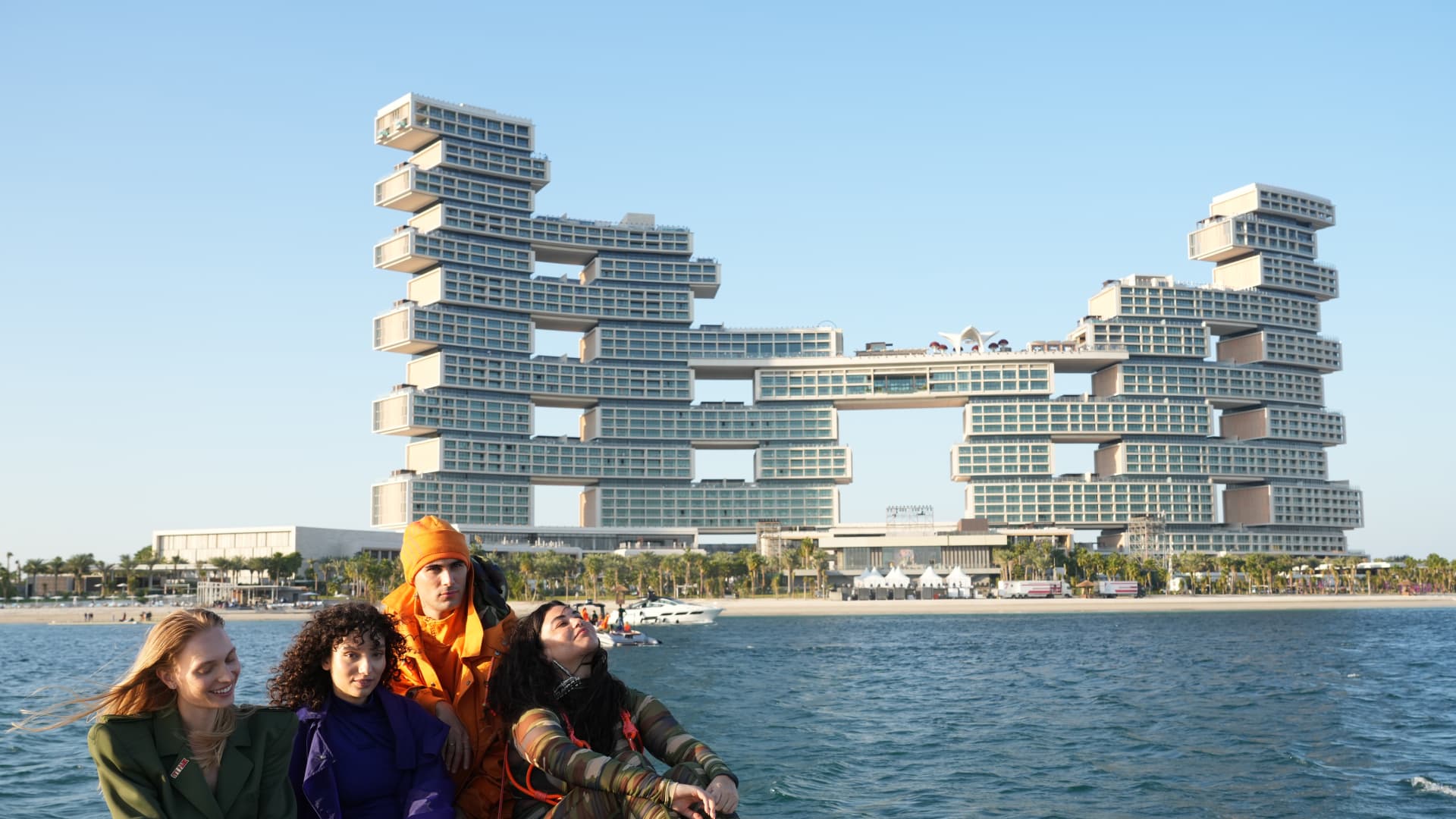Products You May Like
DUBAI, United Arab Emirates — It was the talk of the town. Of the entire country, really — and then some.
Beyoncé was performing her first live concert in more than four years at a private event for the opening of Atlantis The Royal, a $1.4 billion luxury hotel and residential project eight years in the making, located on the outer ring of Dubai’s Palm Jumeirah, a man-made beach archipelago in the Arabian Sea. The megastar was paid a reported $24 million for the night.
The concert, which took place over the weekend, was the grand finale event of the hotel’s “grand reveal,” whose 1,500 guests included model Kendall Jenner, rapper Jay-Z and a host of other influencers, socialites and royals.
The event, footage of which poured onto social media, showed off some of the hotel’s larger-than-life features including a fire and water fountain that coordinated with a light and fireworks show for the Beyoncé performance, eight new celebrity chef restaurants, and a seemingly endless number of infinity pools.
The stats themselves are pretty jaw-dropping. The hotel, 43 storys of what look like gigantic layered Jenga blocks, is home to 795 rooms and suites, 17 restaurants and bars and a whopping 92 swimming pools. Rooms go for an average rate of $1,000 per night, and Atlantis The Royal’s top-end suite costs a casual $100,000 per night. That’s where Beyoncé reportedly stayed.
The 99-acre property built by luxury developed Kerzner International also hosts 231 ultra-luxury residences — all of which have already been sold.
“Following the gig, more fireworks than I’d ever seen filled the sky with explosions,” City AM’s Steve Dinneen wrote of the event. “This joyous, unabashed display of wealth is incredibly on brand for a city that prides itself on going bigger and higher than anyone has gone before.”
Atlantis The Royal’s launch is itself somewhat symbolic of Dubai’s meteoric economic recovery since the coronavirus pandemic and the emirate’s drive to become one of the world’s top three destinations for tourism, luxury and business.
Already well-known for its often over-the-top opulence, glitzy skyscrapers and record-breaking creations —like the world’s tallest building, largest Ferris wheel and biggest mall — the city that ballooned from a small fishing town into a teeming metropolis in just the last few decades seems to be making a new statement.
“Igniting the next chapter of the Atlantis legacy,” Atlantis Dubai wrote in an official tweet along with a promotional video of the opening fireworks.
Unlike the grand opening of Dubai’s first Atlantis luxury hotel, Atlantis the Palm, in 2008 — which preceded the worst financial crash Dubai has seen to date — the UAE’s commercial and tourism capital seems to be confident that this time, economic growth is here to stay.
“We have ambitious growth targets for the sector over the next ten years,” Sheikh Mohammed bin Rashid, the ruler of Dubai, said in a statement after touring the property. “The UAE and Dubai seek to build on their deep partnerships with the private sector to strengthen the country’s status as the world’s most popular destination for international tourists.”
“Our steadfast commitment to building an exceptionally safe and stable environment and a world-class infrastructure over the last few decades has created the foundations for a remarkable future,” he added.
Indeed, economic analysts note a raft of new reforms and regulations made to reduce risk and enable more people to work and live in the majority-expat city, including a remote worker visa, a “golden visa” for high-net worth individuals, liberalizing social reforms and 100% business ownership for foreigners.
Karim Jetha, chief investment officer at Dubai-based asset management firm Longdean Capital, noted the parallels between the new Atlantis hotel’s launch and its sister hotel in 2008, whose opening preceded the economic crash.
“With an uncertain global economic outlook, possibility of recession and a buoyant property market, it’s natural to ask whether history is repeating itself with the opening of Atlantis The Royal,” he told CNBC.
But despite this, he said, “there are good reasons to believe the economy is in a much stronger position this time.” He noted the oil-rich Gulf region’s windfall of higher hydrocarbon prices, and Dubai’s growth as a financial center.
“Dubai has seen a continued influx of wealthy expatriates as well as digital nomads attracted by the quality of life and availability of visas,” Jetha said. “Dubai is also growing in prominence as a financial services hub as underscored by several hedge funds opening up offices there.”
Luxury properties have been selling like hotcakes, aided by the deluge of wealthy Russians and citizens of other ex-Soviet states moving to Dubai to evade the instability and Western sanctions brought on by Russia’s invasion of Ukraine.
The last year registered a record 219 sales in homes classified as “ultra-prime,” or selling for $10 million and higher, according to property firm Knight Frank. That’s more than the cumulative total recorded in the decade between 2010 and 2020.
“The performance at the top of the market clearly demonstrates the arrival of Dubai as a luxury hub to rival long established markets elsewhere, with no sign to suggest a slowdown in the seemingly relentless demand from global ultra-high-net-worth-individuals,” Faisal Durrani, the firm’s head of Middle East research, said in a Jan. 16 press release.
Among the Gulf region’s wealthy, he said, “the UAE remains the second most likely target for a home purchase this year, behind the UK.”
The risk remains that many people in Dubai who don’t fall into the category of very wealthy may be priced out of the market; people who form much of the emirate’s economy. Numerous expats are already being forced to downsize as landlords ask for rent increases upward of 50%.
As property and rental prices continue to climb, Dubai’s dramatic recovery and continuing ascent — most recently highlighted by the lavish opening of Atlantis The Royal — may yet leave some of its residents behind.
